
Well, this one has been a long time coming. This week David Einhorn stated that Microsoft CEO Steve Ballmer has led Microsoft with what he calls “Charlie Brown management,” failing to make wise market decisions, failing to produce creative products, and weighing down on Microsoft’s stock share prices. Einhorn is the president of Greenlight Capital, a key investment firm in Microsoft stock. The firm is well aware of the positive impact that replacing the company’s floundering CEO would have on stock share prices.
Einhorn said,
“It’s time for Microsoft’s board to tell Steve Ballmer, ‘All right, we see what you can do. Let’s give so-and-so a chance,’ His continued presence is the biggest overhang on Microsoft’s stock.”
Table of Contents
Ballmer’s Legacy
Microsoft stock has declined 12 percent this year, while shares of Apple and Google stock have soared to astounding heights. Due to Ballmer’s poor leadership, if you had invested $100,000 in Microsoft stock 10 years ago, you would have lost $31,000 of it by now. Conversely, if you’d invested that in Apple or Google Stock, you’d be a millionaire. Microsoft has consistently failed to adapt to changing market conditions, and has squandered billions in research and development money, all the while failing to produce more than a couple of successful products. Microsoft’s recent Kin phone debacle shamed the company, as did Ballmer’s canning of the Courier, which was viewed by many as the first innovative thing the company had come up with in years.
As if that weren’t a big enough mistake, Ballmer then forced the man responsible for the Courier (and the Xbox) to leave the company, taking his innovative spirit with him. Ballmer is obviously opposed to the idea of Microsoft producing anything even remotely innovative or different. Sure, there are a few great things coming out of Redmond (such as Windows Phone 7), but they are created by people struggling to swim upstream against the current of stagnant thinking.
Microsoft’s Mistake
Unfortunately, both Microsoft’s board and Bill Gates still back Steve Ballmer as CEO, even in the face of all his ridiculous decisions. Based on statements the company has made, it appears that Microsoft’s board believes that they are simply having trouble dealing with the “post-PC world.” Bear in mind, this is the very “post-PC world” created by Apple’s moves in the industry starting with the original iPhone and continuing at a breakneck pace with the iPad and iPad 2. Moves like this shape the future of the industry, and even create new ones altogether. Apple and Google have made brave and innovative moves left and right. Microsoft has largely been a bystander, watching what those two do and then making a move (often the wrong one) a year or two later. Innovation and growth drive stock prices, and Microsoft’s stock has reflected the clear lack thereof.
Finding a Suitable Replacement
So, who could replace Ballmer, should the company ever wise up and can him? Well, there aren’t too many people qualified for the job, but there are a few. One of the biggest contenders is the man he drove away — Jay Allard. Allard was the mind behind the innovative and groundbreaking Courier, and was instrumental in the origins of the Xbox platform — the single most compelling product Microsoft has produced in the last decade. Had Ballmer had his say in the Xbox, it would have been yet another Windows Media Center box. The man lacks vision. Allard has it, and has worked at Microsoft for years. Microsoft is most likely to hire an insider, so his chances are better than those of anyone on the outside.
If you want to look outside the company, one of the only suitable candidates would be Jon Rubenstein of Apple/Palm/HP fame — with one caveat — he cannot be responsible for hardware. Given that Microsoft is a predominantly a software company, this may not matter too much. In fact, Rubenstein’s strengths lie primarily in leading the advancement of great software, and that is exactly what Microsoft needs in a CEO. Rubenstein has experience at both Apple and Palm, and was instrumental in the conception of WebOS and the Palm Pre, in addition to the coming TouchPad, Veer and Pre 3. The TouchPad and WebOS are great, but the Pre and Veer have been widely criticized for their slider design and cramped keyboards. The fact that Rubenstein has failed to address these issues, and has even gone as far as to release multiple new models utilizing the same failed design shows us that he doesn’t necessarily adapt too well in the hardware arena. That said, the man has vision — the kind Microsoft needs right about now. If he were paired with the right product design teams, they could really make the magic happen at Microsoft.
Last, but so far from least, Bill Gates. This one is pretty unlikely to happen, as Gates has already retired from his work at Microsoft and moved on to other pursuits. He isn’t necessarily an innovative man, per se, but his drive and vision far, far exceed anything Ballmer will ever achieve. Furthermore, Gates values Microsoft and its future more than anyone else ever could. Microsoft is Gates’ baby, and the successes of his current ventures are inextricably linked to the success of Microsoft, due to the way some of them are funded. Could a triumphant return of Bill Gates to Microsoft turn the company around? We may never know.
In Closing
Microsoft has a great legacy. Competition is great for the market, and it’s sad to see one of Apple’s biggest competitors of yesteryear squandering its legacy away, all because they have a bumbling bafoon at the helm. With a new CEO, the company might just have another shot at greatness. Here’s to the future of a once great company — and the hope that they will once again become the fierce competitor they once were.
Photo Credit: Erwin Boogert






